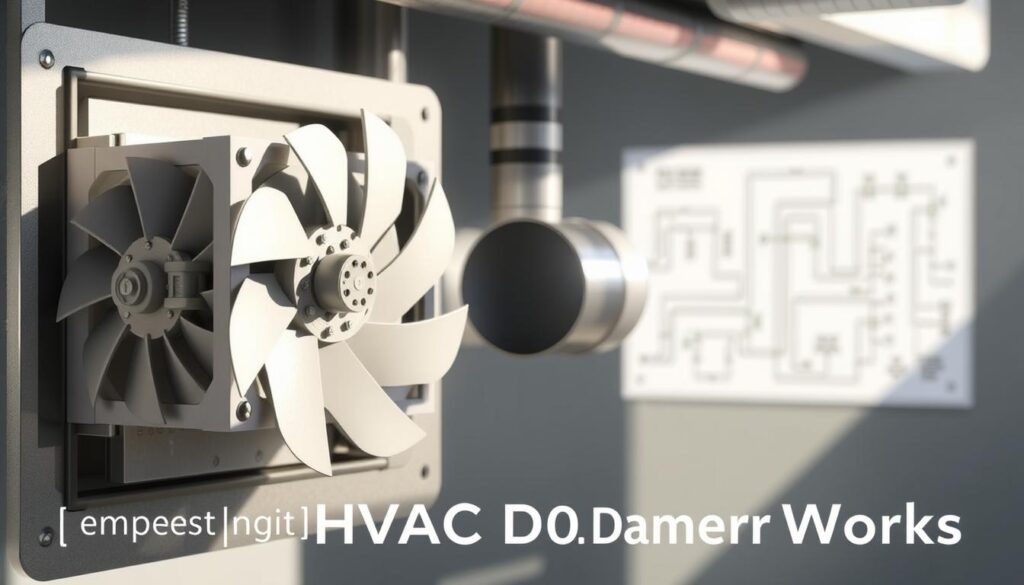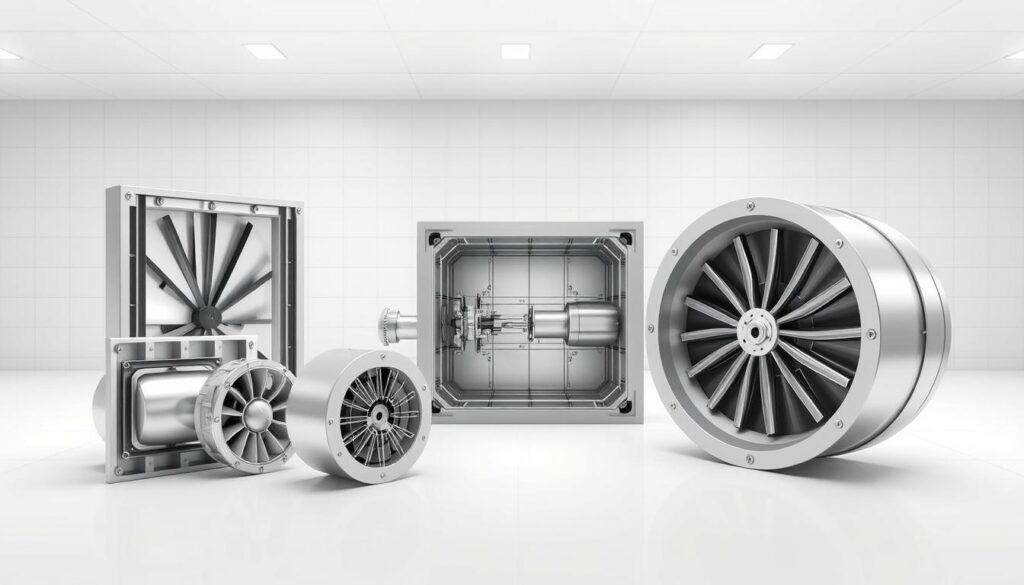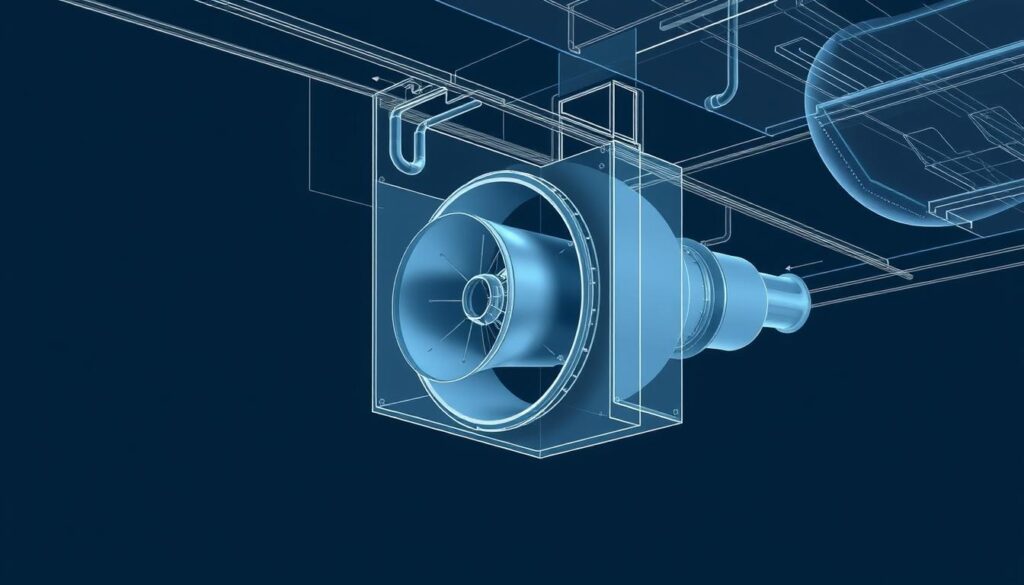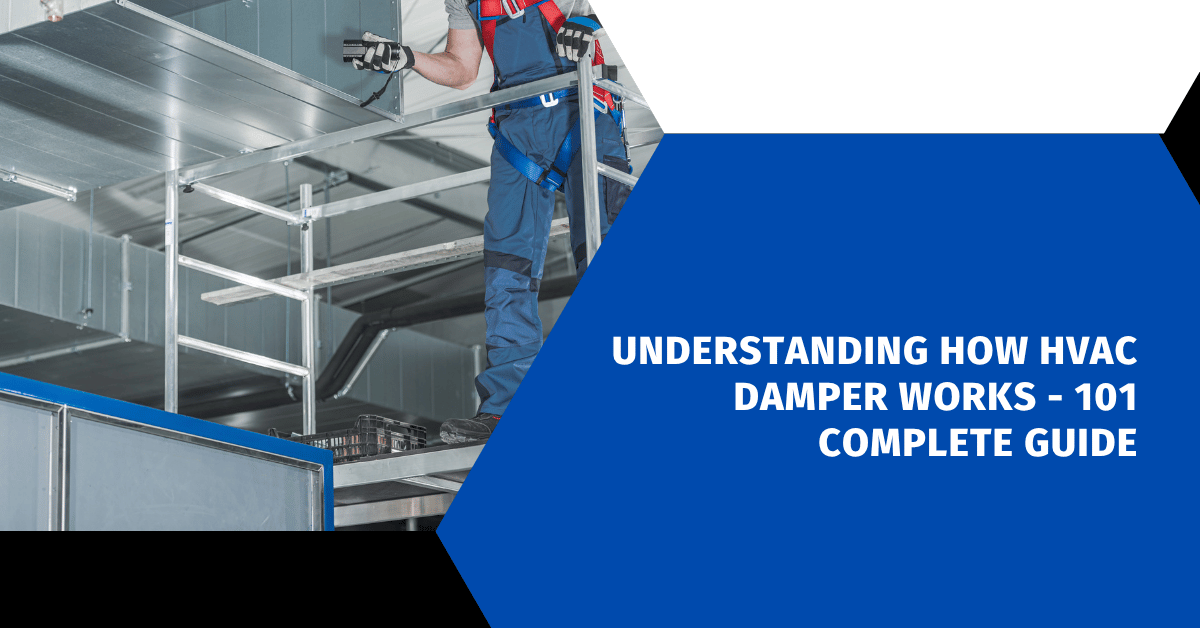Affiliate Disclosure
HVAC Guide Guys is a participant in the Amazon Services LLC Associates Program, an affiliate advertising program designed to provide a means for sites to earn advertising fees by advertising and linking to Amazon.
How HVAC Damper Works? Are you tired of having uneven temperatures and high energy bills at home? What if a small device could make your home more comfortable and save you money?

HVAC dampers are key parts that control air flow in your home’s heating and cooling system. They are important for making sure each room gets the right amount of air.
Learning how HVAC dampers work can help you control your home’s climate better. By managing air flow, they can make your home more comfortable and even save you money on energy.
Your HVAC system uses these smart regulators to keep temperatures balanced and air flowing right. They are great for homes with many floors or rooms that have different temperatures. Dampers help manage air flow precisely.
Key Takeaways
- HVAC dampers control airflow in heating and cooling systems
- Proper damper management can improve home comfort
- Dampers help optimize energy efficiency
- Different types of dampers serve specific temperature control needs
- Strategic placement enhances overall HVAC performance
Table of Contents
What Are HVAC Dampers and Their Basic Function
HVAC dampers are key parts of your home’s heating and cooling system. They help manage airflow and control temperature. These devices make your home comfortable and save energy.
HVAC dampers are special devices in your ductwork. They control air flow in your home. By adjusting these dampers, you can feel more comfortable and use less energy.
Key Components of HVAC Dampers
- Frame: Sturdy metal housing installed in ductwork
- Blades or Vanes: Adjustable elements controlling airflow
- Actuator: Mechanism that opens and closes damper blades
- Control System: Allows precise hvac duct damper management
Role in HVAC Systems
Zoning systems use HVAC dampers to make different temperature zones in your home. By closing dampers in unused areas, you can save 10-20% on energy costs. Homes with zoning systems can save up to 25% more than traditional systems.
Primary Operating Principles
When damper blades are open, air flows freely. When closed, air flow is blocked, allowing for precise temperature control. This ensures comfort and efficiency in specific areas.
“HVAC dampers are the unsung heroes of home comfort, silently working to create the perfect indoor environment.”
About 50% of home energy use is for HVAC systems. Knowing how to use dampers can save you money and make your home more comfortable.
Benefits of HVAC Dampers in Your Home
HVAC dampers are a big deal for home comfort and saving energy. They bring amazing benefits that can change your home and save you cash.
With hvac system dampers, you get exact temperature control in every room. A 2022 study showed that zoning systems can cut heating and cooling costs by up to 30 percent.
Key Advantages of HVAC Damper Control
- Enhanced energy efficiency
- Customized room temperature management
- Improved indoor air quality
- Potential long-term cost savings
Hvac damper control lets you make your own comfort zones. It’s great for multi-story homes, fixing temperature issues between floors.
| Damper Type | Energy Savings | Lifespan |
|---|---|---|
| Automatic Dampers | Up to 30% | 20 years |
| Manual Dampers | 15-25% | 10-15 years |
“Smart damper management can be the difference between an inefficient and a perfectly balanced home climate.” – HVAC Experts
By controlling airflow, you avoid wasting energy. Dampers make air distribution better, easing your HVAC system’s work and maybe making it last longer.
Getting hvac system dampers is wise. It’s not just about feeling good—it’s a smart money move. It saves energy and improves your home’s air quality.
Explore Our HVAC Shop
Looking for top-rated HVAC tools, parts, and accessories? Visit our shop and find the perfect solution for your needs.
Visit the ShopManual vs Automatic HVAC Dampers: Key Differences
Knowing the differences between manual and automatic HVAC air dampers is key. They both have benefits for your home’s heating and cooling. The right choice depends on your home’s needs.
Choosing the right HVAC damper is important. We’ll look at the main points of manual and automatic dampers.
Manual Damper Operation
Manual HVAC air dampers are controlled by you. They have:
- Hand-controlled levers
- Need direct user action
- Are often cheaper
- Have a simple design
Automatic Damper Features
Automatic dampers offer advanced features for better climate control:
- Motorized with remote control
- Adjust automatically based on the environment
- Work with smart home systems
- Save more energy
Choosing Between Manual and Automatic Systems
Many factors influence your choice:
| Consideration | Manual Dampers | Automatic Dampers |
|---|---|---|
| Initial Cost | Lower | Higher |
| Precision Control | Limited | Excellent |
| Energy Efficiency | Basic | Optimal |
| Convenience | Manual Adjustment | Automated |
“The right damper can transform your home’s comfort and energy efficiency.” – HVAC Professional
Pro tip: Think about your budget, comfort with technology, and energy savings over time.
Common Types of HVAC Dampers
Knowing about different hvac damper types is key to better climate control in your home. HVAC system dampers help control airflow, boost efficiency, and keep your space comfortable.

Let’s look at the most common hvac system dampers for managing air flow in homes and businesses:
- Volume Control Dampers: Control airflow in various building areas
- Fire Dampers: Important for safety, closing in fire situations
- Smoke Dampers: Stop smoke from spreading through ducts
- Zone Dampers: Allow temperature control in different zones at once
- Backdraft Dampers: Keep air from moving the wrong way
“Choosing the right HVAC damper can greatly enhance your system’s performance and energy use.”
Here’s a closer look at these hvac damper types and what they do:
| Damper Type | Primary Function | Typical Application |
|---|---|---|
| Volume Control Dampers | Adjust airflow volume | Residential and commercial HVAC systems |
| Fire Dampers | Prevent fire spread | Building fire protection systems |
| Smoke Dampers | Stop smoke migration | Multi-story buildings, hospitals |
| Zone Dampers | Control individual room temperatures | Zoned HVAC installations |
| Backdraft Dampers | Prevent reverse airflow | Ventilation systems, kitchens |
Understanding these hvac damper types helps you make smart choices for your home’s climate control. Each damper has a special role, improving system efficiency, safety, and comfort.
Explore Our HVAC Shop
Looking for top-rated HVAC tools, parts, and accessories? Visit our shop and find the perfect solution for your needs.
Visit the ShopHow HVAC Damper Works: Understanding the Mechanism
Learning about HVAC dampers is key for keeping your home comfy and saving energy. These smart devices help control air and temperature in your space.
Airflow Control Process
HVAC dampers manage air with great care. They open and close in your ducts to send air where it’s needed. This way, they:
- Send air to certain areas
- Keep temperatures steady
- Make your HVAC system work better
Temperature Regulation Method
It’s important to know how HVAC dampers control temperature. They work with your thermostat to heat and cool your home smartly. This can cut energy use by 30% compared to old systems.
“Precision airflow control is the key to maintaining consistent home comfort.” – HVAC Engineering Professionals
System Integration Aspects
Today’s HVAC dampers fit right into your heating and cooling systems. Automatic dampers adjust on their own to save energy, cutting costs by about 20% each year.
- Automatic dampers adjust without manual intervention
- Improve overall system efficiency
- Extend HVAC component lifespan
By grasping these complex workings, you’ll see how dampers change your home’s climate control.
Strategic Placement of HVAC Dampers

Knowing where to put HVAC dampers is key to a comfy and energy-saving home. Installing them right means thinking about your home’s layout and heating and cooling needs.
The main spots for HVAC duct damper placement are:
- Main trunk lines before and after major junctions
- Intersections of multiple system ducts
- Zones with different temperature requirements
- Areas with variable airflow demands
“Proper damper placement is like creating a precise roadmap for air circulation in your home.” – HVAC Engineering Experts
Getting HVAC dampers installed right depends on a few important things:
- Home architectural design
- Room-specific heating and cooling needs
- Existing ductwork configuration
- Zoning requirements
| Damper Location | Purpose | Efficiency Impact |
|---|---|---|
| Main Trunk Lines | Primary Airflow Control | High |
| Zone Junctions | Temperature Regulation | Medium |
| Individual Room Ducts | Personalized Comfort | Low |
Professional HVAC contractors say placing dampers strategically boosts system performance and cuts energy use.
Explore Our HVAC Shop
Looking for top-rated HVAC tools, parts, and accessories? Visit our shop and find the perfect solution for your needs.
Visit the ShopSeasonal Adjustment Guide for HVAC Dampers
Keeping your home comfortable all year needs smart HVAC damper control. Learning to adjust your dampers can make your home warmer or cooler where you need it. It also saves energy.
Changing how your HVAC dampers work with the seasons is key. It makes sure every room is just right. Smart seasonal changes can greatly improve your home’s feel.
Summer Settings Optimization
In summer, focus on cooling your home efficiently:
- Open upper-level dampers to let cool air in
- Send cool air to rooms you use most
- Close dampers in cooler spots
“Proper damper positioning can reduce cooling costs by up to 20% during hot months.”
Winter Configuration Tips
Winter needs a different HVAC damper strategy:
- Close upper-level dampers to keep warmth in
- Send warm air to main living areas
- Adjust dampers for natural heat rise
Transition Period Adjustments
When seasons change, watch your HVAC system closely. Experts say check damper settings every 2-3 days to keep comfort steady.
With these seasonal damper tips, your home will be cozy and energy-smart all year.
HVAC Damper Maintenance and Care
Keeping your HVAC system dampers in good shape is key for top performance and long life. Regular upkeep can avoid expensive fixes and keep your heating and cooling system efficient.
Proper care for your HVAC dampers includes several important steps. These steps help keep your system working well:
- Inspect dampers every six months for wear and alignment
- Clean damper blades and surrounding components
- Lubricate moving parts to reduce friction
- Check for signs of rust or mechanical damage
“A well-maintained damper can extend the life of your HVAC system by up to 50%,” says HVAC expert Michael Rodriguez.
Different dampers need different care. Butterfly dampers can last about 20 years with the right care. Electric dampers usually last 15 years.
| Damper Type | Maintenance Frequency | Key Care Practices |
|---|---|---|
| Butterfly Dampers | Twice a year | Lubrication, alignment check |
| Fire Dampers | Annual professional inspection | Mechanism testing, debris removal |
| Electric Dampers | Every 6-12 months | Motor function test, electrical connection review |
Look out for signs that your dampers need help right away. Strange noises, uneven airflow, or trouble opening and closing are signs. If you’re unsure, get a pro HVAC tech to check it out.
Explore Our HVAC Shop
Looking for top-rated HVAC tools, parts, and accessories? Visit our shop and find the perfect solution for your needs.
Visit the ShopTroubleshooting Common HVAC Damper Issues
Your HVAC system works best when its air dampers function right. Knowing how to spot and fix common problems can save you time and money. It also helps avoid frustration.
HVAC air damper issues can show up in many ways. They can affect your home’s comfort and how much energy it uses. Spotting these problems early can stop bigger system failures.
Identifying Performance Problems
Look out for these key signs of hvac damper trouble:
- Uneven room temperatures
- Unusual noises from ductwork
- Increased energy bills
- Restricted airflow in specific zones
Quick Fix Solutions
Some hvac damper problems can be fixed easily at home:
- Lubricate stuck damper blades
- Check and tighten loose connections
- Clean dust and debris from damper mechanisms
- Verify electrical connections for automatic dampers
When to Call a Professional
Some issues need a pro’s help:
| Issue | Professional Recommendation |
|---|---|
| Persistent temperature inconsistencies | Immediate professional inspection |
| Electrical control system failures | Certified HVAC technician required |
| Complex mechanical damper problems | Expert diagnostic and repair |
“Proactive maintenance prevents costly HVAC system replacements”
Understanding your hvac damper and spotting issues early helps keep your home comfy and efficient. Regular checks and quick action are essential for your HVAC’s long-term health.
Energy Efficiency and Cost Savings with HVAC Dampers
Your HVAC system is a big energy investment. Using hvac damper control can change how much energy your home uses. It can also make your home more comfortable and save you money on bills.
Here are some key energy-saving points:
- Up to 30% energy savings with smart damper use
- Potential 25% cut in utility bills with zone temperature control
- Longer life for your HVAC system by reducing strain
“Smart damper management is like having a precision thermostat for each room in your home.”
Motorized dampers work better than manual ones. They let you control the temperature in different areas. This means you don’t waste energy on rooms that aren’t being used.
The money you save is big. Most people get their money back from damper installation in 2-5 years. New HVAC systems with dampers can even adjust to how many people are in a room.
- Reduce temperature changes by 50%
- Save on heating and cooling
- Make comfort zones just for you
Getting high-quality hvac damper control is more than saving money. It’s about making your home smarter and more comfortable, tailored to your needs.
Conclusion
Knowing how HVAC dampers work is key to a comfy and efficient home. These parts help control airflow and temperature. They make your heating and cooling systems work better and save energy.
Good HVAC dampers do more than just control temperature. They also improve air quality and cut down energy bills. Studies show they can lower energy costs by up to 25% a year. This makes them a smart choice for those who want comfort and savings.
Understanding HVAC dampers helps you make better choices for your system. You can learn about different types and how they affect comfort. Regular checks and maintenance can also extend your system’s life and efficiency.
Even as technology gets better, HVAC dampers are essential for a great indoor space. With what you’ve learned, you can manage your home’s climate. This will save you money and keep you comfortable all year.

